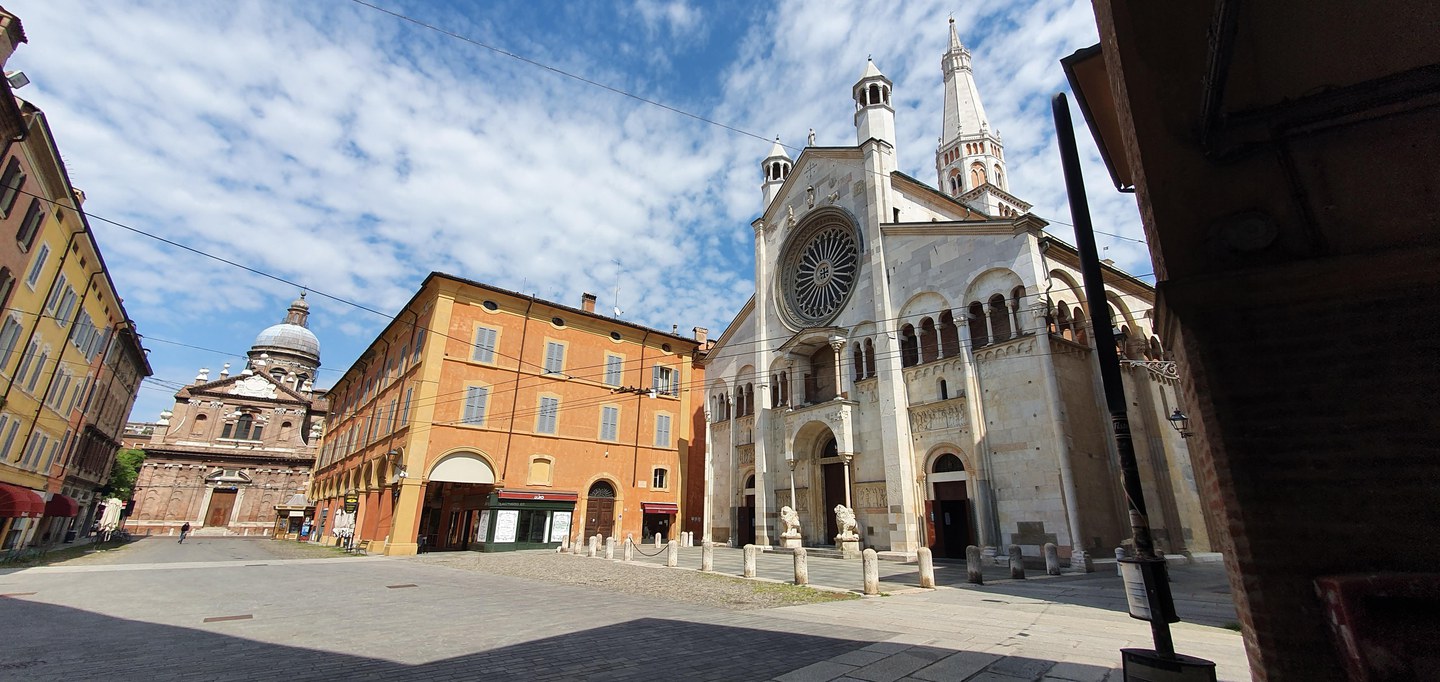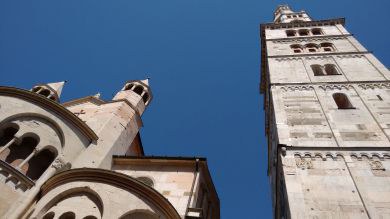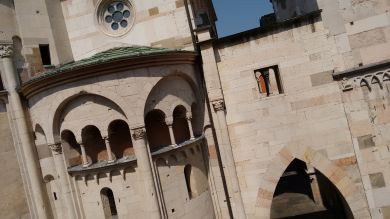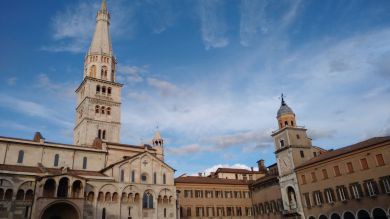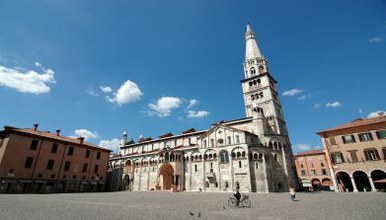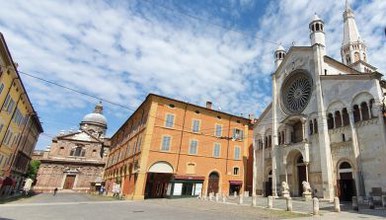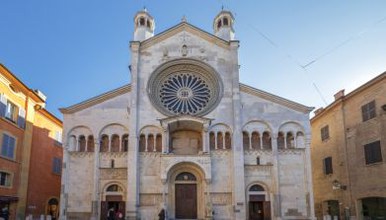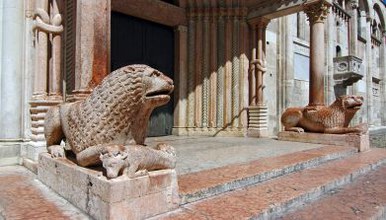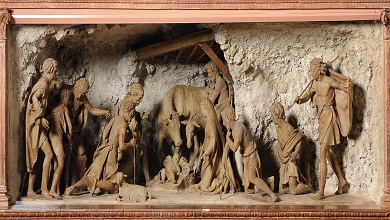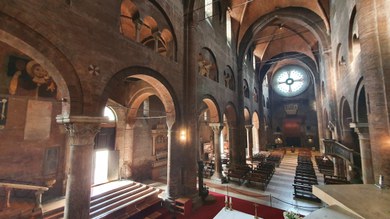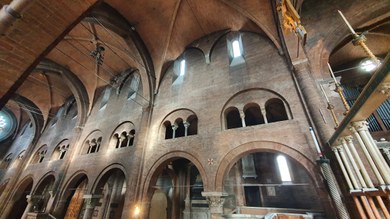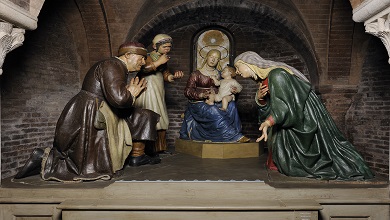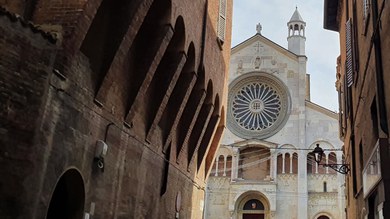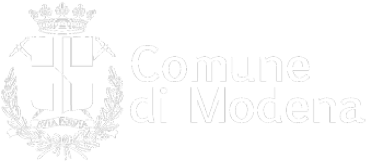The Cathedral OF MODENA
June 9th 1099 was a very important date for the city of Modena. On this day, the first stone of the city’s new cathedral was laid, which will soon become a magnificent example of Romanesque art that amazed the community at that time and still today fills us with wonder for its extraordinary beauty and originality. An account from this period, the Relatio de innovazione ecclesiae Sancti Geminiani, tells us that the choice of the architect came about by miraculous divine inspiration: Lanfranco, whose work created a bold new form of architecture, a model for the Romanesque art that flourished after him. Scientific investigation carried out during the recent renovation work that started in 2006 has revealed that material salvaged from the Roman Modena, Mutina, was used for the stone cladding of the building.
Lanfranco’s structure, a basilica divided into three naves by alternating columns and pillars with a raised presbytery over the crypt, was then harmonically sculpted by Wiligelmo. This sculptor and others active in the early twelfth century were responsible for the splendid decorations that cover the capitals in the loggia, the engaged columns and ledges in the underlying small arches. These architectural patterns in the form of plants and fantastic beings appear at regular intervals around the entire perimeter of the Duomo.
The main portal and most of the sculptures on the façade, whether holy or profane, heavenly or monstrous were also the product of Wiligelmo’s workshop. They summarise the entire spiritual world of a medieval person: faith, hope, fears, beliefs and doubts. After nine centuries, the touching expressiveness of Wiligelmo’s Reliefs from Genesis carved on huge stone slabs, also recycled, remain however unparalleled.The stories of Adam and Eve, Cain and Abel and Noah’s Ark still maintain their original strong intensity, unusual emotional charge and extraordinary narrative force.
The relief work decorating the other two doors opened by Lanfranco into the Cathedral also date back to the first two decades of the twelfth century. The Porta dei Principi, (Princes’ Gate) which looks onto Piazza Grande, embraces visitors and illustrates the history of Saint Geminianus, the patron saint of Modena, visually represented and transformed into narrative with images of a unique quality.
On the northern side, near the Ghirlandina belltower, visitors can admire the "Porta della Pescheria" (Fish-Market gate), whose originality is shown by the expressiveness of the two sculpted Telamons, who appear to be asking anyone who crosses the threshold for help in carrying their huge burden. People and their labour are also represented in the sculpted door frames, each depicting the twelve months of the year portrayed as agricultural workers busy in the fields. Fantastic tales are featured on both archivolts, carved with the adventures of King Arthur in Bretagne, while in the architrave, animals from ancient fables by Phaedrus and the Roman de Rénard emerge from intricate tangles of plant life.
Of particular note are the Metopes, sculptural reliefs located on the roof projections, depicting a lively group of imaginary and monstrous beings. The sculptures that can be admired today on the Cathedral are reproductions, as the originals have been moved to the “Epigraphic Museum” for conservation purposes.
Before the arrival of the Maestri Campionesi, around 1170 and 1180, numerous architects from the Po Valley contributed to the expansion of the building. These skilled masters, perhaps following the example of the sculptures in Parma's baptistery, designed the pulpit and the rood screen inside the Cathedral, that leads to the crypt's entrance.
From the late XII century to the first half of the XIV century, the Campionesi Masters worked on the Cathedral and the Ghirlandina belltower. These were groups of builders and sculptors from Campione, on Lake Lugano, organised in different family workshops. It was the Campionesi Masters who opened the large rose window and the two lateral doors in the façade, and the magnificent Porta Regia on Piazza Grande, which stands out in contrast to the white wall of the cathedral due to the chromatic effects of its fine rose-coloured marble. They also designed and built the false transept added to the original basilica layout designed by Lanfranco.
INSIDE THE CATHEDRAL
In the central nave, Enrico da Campione built the pulpit in 1322.
The crypt houses the sepulchre of San Gemimianus, patron saint of Modena, and a masterpiece from Modena Renaissance, Adoration of the Shepherds, a group in polychrome terracotta Guido Mazzoni (1480 – 1485 ca).
The Cathedral is also home to other important works, mainly from the fifteenth and sixteenth centuries, the Altarpiece by Michele da Firenze (circa 1442), the Inlaid wooden choir by the Lendinara brothers (1465), the Bellincini Chapel (circa 1475), the Saint Sebastian Panel by Dosso Dossi (1518 – 1522) and the Nativity Scene by Antonio Begarelli (1527)
Together with the Ghirlandina belltower and Piazza Grande, the cathedral has been a UNESCO World Heritage Site since 1997.
Opening hours
From Tuesday to Sunday from 7.00 am to 7.00 pm;
On Monday, from 7.00 am to 12.30 pm and from 3.30 pm to 7.00 pm;
Visits are not allowed during celebrations.
Tickets and admission
Admission is free, except for the upper presbytery, from which visitors can enjoy an elevated view of the central nave and the counter-façade where the rose window is located, and the sacristy.
The paid area is not accessible to persons with motor disabilities.
Presbytery and Sacristy Route
Visiting Hours:
- Tuesday to Saturday: from 10:00 AM to 5:00 PM
- Sunday: from 1:00 PM to 5:00 PM
- Monday: the route is closed to the public.
Entrance ticket: € 3.00 per person
By presenting the ticket for the Presbytery–Sacristy route, visitors are entitled to a reduced admission fee to the Cathedral Museums: € 3,00 per person.
Conversely, the Presbytery–Sacristy route is free of charge for those presenting a ticket from the Cathedral Museums.
To know before you go
If you are organizing a trip for a group.
Admission is free of charge but you need to book in advance a time slot for your visit. Please click here to read the visit regulations. Click here to book your time slot.

